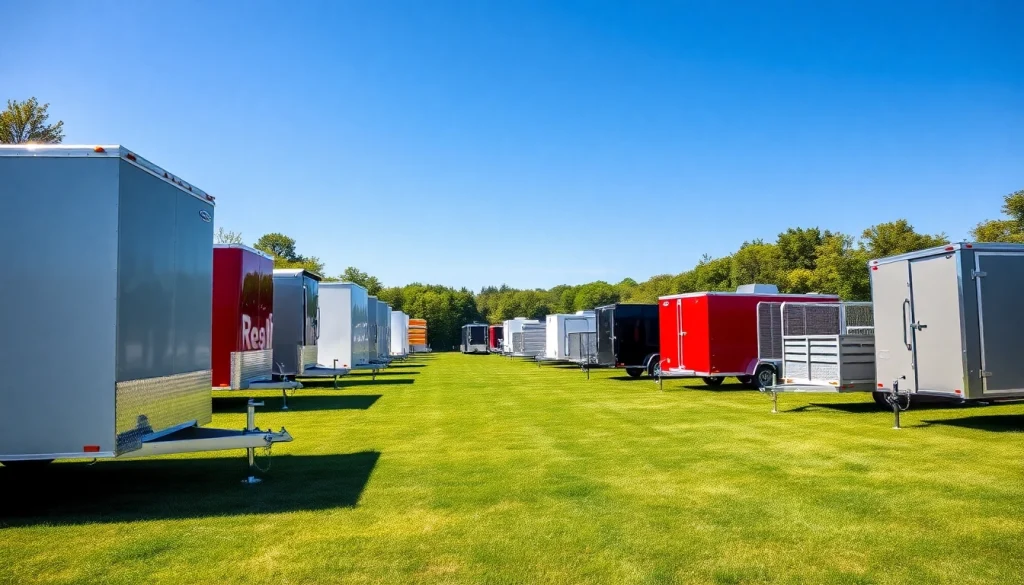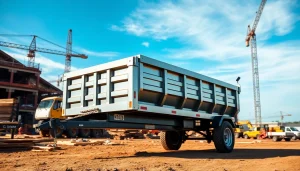Quality Trailers for Sale in Massachusetts: Your Ultimate Buying Guide

Understanding the Types of Trailers for Sale in Massachusetts
When searching for trailers for sale in Massachusetts, it’s essential to familiarize yourself with the different types available. Each trailer type has specific features designed for various purposes, whether for transporting goods, hauling equipment, or serving recreational needs. In this section, we’ll explore some of the most common trailer types available in Massachusetts.
Enclosed Trailers: Benefits and Uses
Enclosed trailers are designed to provide protection from the elements. They are typically constructed with durable materials such as aluminum or steel, combined with insulated walls, which make them an excellent choice for transporting sensitive cargo that requires climate control. One significant advantage of enclosed trailers is their security. Many models come equipped with lockable doors and reinforced construction, deterring theft and vandalism.
Businesses often use these trailers for transporting inventory, tools, and equipment. Additionally, they can serve as mobile offices, making them popular among contractors. To maximize efficiency, consider options such as built-in shelving, ventilation systems, and electrical setups to power equipment inside.
Dump Trailers: Essential for Heavy Loads
Dump trailers are invaluable when it comes to transporting heavy materials and debris, such as sand, gravel, and construction waste. Their unique design enables them to be raised, allowing for quick and efficient unloading. This feature makes dump trailers a staple for landscaping businesses and construction sites.
Selecting the right dump trailer involves understanding your load requirements. Dump trailers come in different sizes and weight capacities, so it’s crucial to choose one that aligns with your specific needs. Features to look for include hydraulic lift systems for ease of use, sturdiness, and durable ramps for added versatility.
Utility Trailers: Versatile Options for Everyday Needs
Utility trailers are among the most flexible types available. They can be used for various purposes, including transporting lawn equipment, ATVs, motorcycles, or even furniture during relocations. The open design of utility trailers allows for easy loading and unloading of goods.
Utility trailers vary in size and weight ratings, making them suitable for personal, commercial, or light industrial use. When deciding on a utility trailer, consider factors like the type of hitch required, the weight capacity, and whether additional features like side rails or mesh gates would enhance usability.
How to Choose the Right Trailer for Your Needs
Choosing the right trailer can seem daunting given the numerous options available. However, understanding your specific needs can simplify the selection process. Here are key aspects to consider when making your decision.
Assessing Size Requirements
The first step in choosing the right trailer size is to assess what you will be transporting. Measure the longest and widest items you’ll carry to ensure that the trailer can accommodate them comfortably. Keep in mind not just the dimensions but also the total weight of your load.
Additionally, consider how you will store the trailer when not in use. Make sure it fits in your garage or designated storage area without protruding into shared spaces.
Evaluating Weight Capacity
Each trailer comes with a specific weight capacity, often referred to as the Gross Vehicle Weight Rating (GVWR). It’s critical to select a trailer that can safely handle the maximum load you expect to carry. Overloading a trailer can lead to dangerous driving conditions and can increase wear and tear on the trailer itself, leading to costly repairs.
Examine both the payload capacity, which refers to the cargo weight, and the trailer’s weight, which is often subtracted from the GVWR for determining how much additional weight you can carry.
Matching Trailer Style to Purpose
Different trailer styles serve distinct purposes. For example, if you’re engaged in construction or landscaping, a dump trailer might suit your needs best. On the other hand, if transporting items that require protection from weather, an enclosed trailer would be the right choice.
Consider how often and in what conditions you will use your trailer. This will help inform whether you need added features such as a tilt deck, removable sidewalls, or specific hitch types.
Financing Options for Buying Trailers in Massachusetts
Purchasing a trailer is a considerable investment, and understanding your financing options is key to making an informed decision. Several avenues are available, each with its own benefits and considerations.
Understanding Purchase vs. Rent-to-Own
Many trailer dealers offer both purchase and rent-to-own options. Purchasing a trailer outright gives you complete ownership and flexibility, whereas rent-to-own options can allow you to pay in installments until the total price is met. This option might be appealing for individuals or businesses looking to conserve cash flow while still accessing the equipment they need.
Regardless of the financing method, it’s crucial to review the total costs, including interest rates, fees, and terms, so you have a clear understanding of your commitment.
Finding the Best Loan Terms
If you opt for financing through a loan, shop around for the best terms. This means comparing interest rates, repayment periods, and any associated fees. Many credit unions and banks provide competitive rates on loans for trailers due to the tangible asset’s resale value.
Before signing any agreements, carefully consider your budget and repayment capabilities. This ensures you won’t face financial strain in the long run while trying to make monthly payments.
Budgeting for Additional Costs
In addition to the purchase price, be sure to factor in additional costs like insurance, registration, maintenance, and any relevant taxes when planning your budget. Each of these elements can impact your total expenditure, so a comprehensive financial plan will serve you well in the long run.
Regular maintenance issues might arise, especially for trailers that experience heavy use, so setting aside funds for upkeep is advisable. Moreover, understanding the resale value can also inform your purchasing decision in line with your budget.
Maintenance Tips for Longevity of Trailers
Maintaining your trailer is essential for ensuring its longevity and optimal performance. Regular checks and maintenance can prevent major issues down the line, saving you time and money.
Regular Inspections and Upkeep
Conducting regular inspections is vital. This includes checking lights, brakes, tires, and the hitch for any signs of wear or damage. Lubricating moving parts, inspecting the electric brake system, and ensuring that tires are properly inflated can also extend the life of your trailer.
Make it a habit to clean your trailer after use, removing dirt and debris that can cause rust over time, especially for open trailers that are more exposed to the elements.
Common Repairs for Trailers
Familiarizing yourself with common repairs can help you address issues before they escalate. This includes knowing how to change a tire, maintain brake systems, and repair or replace damaged wiring. If you lack the skills to perform these repairs, find a reputable mechanic who specializes in trailers for assistance.
Having a toolkit with essential tools handy can simplify DIY repairs and help you address minor issues quickly, maximizing your trailer’s utility.
Storage and Protection from Elements
Storing your trailer properly protects it from the elements and prolongs its lifespan. If possible, store it under a roof or invest in a quality cover that shields it from rain and sun exposure. This is especially critical for trailers with closed options that can trap moisture, leading to corrosion.
Regularly inspecting the storage area for pests and moisture is also important, as rodents and mold can significantly degrade the condition of your trailer.
Insights into the Massachusetts Trailers Market
The Massachusetts trailers market is quite dynamic, with various trends and factors impacting availability and pricing. Understanding these trends can aid potential buyers in making informed decisions.
Current Trends and Popular Models
In recent years, there has been a growing preference for lightweight trailers designed for efficiency and ease of use. Enclosed trailers have seen increased demand for both personal and commercial use, driven by heightened awareness around safety and protection of transported goods.
Moreover, the customization trend is evident; many buyers are looking for trailers equipped with specific features that meet their unique needs, such as built-in shelving, ramps, or specialized braking systems.
The Impact of Seasonal Demand
Seasonality can greatly affect trailer sales. For instance, the demand for utility and enclosed trailers typically peaks in the spring and summer as homeowners and contractors prepare for renovation projects. Conversely, winter often sees a decline in sales for certain types of trailers, particularly those used for outdoor recreation.
Recognizing these patterns can inform your timing for buying a trailer. If you’re flexible in your purchase time, consider shopping off-peak to potentially find better deals.
How to Leverage Online Resources for Best Deals
In today’s digital age, ample online resources can help you find the best deals on trailers. Websites dedicated to trailer sales provide filters to sort options by price, weight capacity, and type, making it easier to find suitable models. Reviews and ratings from previous users can provide insight into quality and reliability.
Additionally, various forums and social media groups are a great way to gather opinions from other trailer owners. They can offer valuable advice on where to buy, which models perform best, and the latest market trends.







